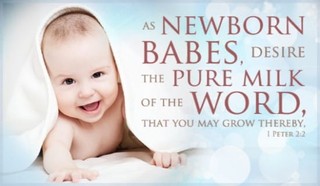
- Recent Translations
- All Translations
1 Peter 2:8
Share
Settings
Images for 1 Peter 2:8

1 Peter 2:8 Meaning and Commentary
And a stone of stumbling, and a rock of offence
The apostle alludes to ( Isaiah 8:14 ) and which is a prophecy of the Messiah; (See Gill on Romans 9:33) and had its accomplishment in the unbelieving and disobedient Jews; who stumbled at his birth and parentage; at the manner of his birth, being born of a virgin; at the meanness of his parents, his supposed father being a carpenter, and his mother, Mary, a poor woman, when they expected the Messiah would have sprung from some rich and noble family; and at the place of his birth, which they imagined was Galilee, from his education and conversation there; they stumbled also at his education, and could not conceive how he should know letters, and from whence he should have his wisdom, having never been trained up in any of their schools and academies, or at the feet of any of their doctors and Rabbins; but, on the other hand, was brought up and employed in the trade of a carpenter; they stumbled at his outward meanness and poverty, when they expected the Messiah would be a rich, powerful, and glorious monarch; and so at the obscurity of his kingdom, which was not of this world, and came not with observation, when they dreamt of an earthly and temporal one, which should be set up in great splendour and glory; and they stumbled likewise at the company he kept, and the audience that attended him, being the poorer sort of the people, and the more illiterate, and also such who had been very profane and wicked, as publicans and harlots; moreover, they stumbled at his ministry, at the doctrine he preached, particularly at the doctrine of his divinity, and of spiritual communion with him, by eating his flesh, and drinking his blood, and at the doctrines of distinguishing grace; and so at his miracles, by which he confirmed his mission and ministry, some of these being wrought on the sabbath day, and others they imputed to diabolical influence and assistance, in a word, they stumbled at his death, having imbibed a notion that Christ abideth for ever, and especially at the manner of it, the death of the cross; wherefore the preaching of Christ crucified always was, and still is, a stumbling block unto them:
even to them which stumble at the word;
either the essential Word, Christ Jesus, as before; or rather at the doctrine of the Gospel, at that part of it which respects a trinity of persons in the Godhead; because their carnal reason could not comprehend it, and they refused to submit to revelation, and to receive the witness of God, which is greater than that of men; and at that part of it which regards the deity of Christ, and that for this reason, because he was a man, and in order to enervate the efficacy of his blood, righteousness, and sacrifice, and fearing too much honour should be given to him; and also at that part of the word which concerns the distinguishing grace of God, as eternal personal election, particular redemption, and efficacious grace in conversion; against which the carnal mind of man is continually cavilling and replying, and, in so doing, against God himself, charging him with cruelty, injustice, and insincerity; and particularly at that part of the word which holds forth the doctrine of free justification, by the righteousness of Christ; this was the grand stumbling block of the Jews, who sought for righteousness, not by faith, but, as it were, by the works of the law, being ignorant of the righteousness of God, and of the spirituality of the law, and of themselves, and their own righteousness, of which they had an overweening opinion:
being disobedient;
to the Gospel revelation, and unwilling to submit their carnal reason to it; this is the source and cause of their stumbling at Christ and his Gospel: it is worth while to compare this with the paraphrase of ( Isaiah 8:14 ) which passage is here referred to; and the paraphrase of it runs thus;
``"if ye obey not", his word shall be among you for revenge, and for a stone smiting, and for a rock of offence to both houses of the princes of Israel, and for destruction and offence to those who are divided upon the house of Judah, &c.''whereunto also they were appointed;
both to stumble at the word of the Gospel, and at Christ, the sum and substance of it, he being set in the counsel and purpose of God, as for the rising of some, so for the stumbling and falling of others; and also to that disobedience and infidelity which was the cause of their stumbling; for as there are some whom God appointed and foreordained to believe in Christ, on whom he has determined to bestow true faith in him, and who have it as a pure gift, in consequence of such appointment; so there are others, whom he has determined to leave in that disobedience and infidelity into which the fall brought and concluded them, through which they stumble at Christ, and his word, and, in consequence thereof, justly perish; but this is not the case of all; there are some who are the objects of distinguishing grace and favour, and who are described in the following verse.